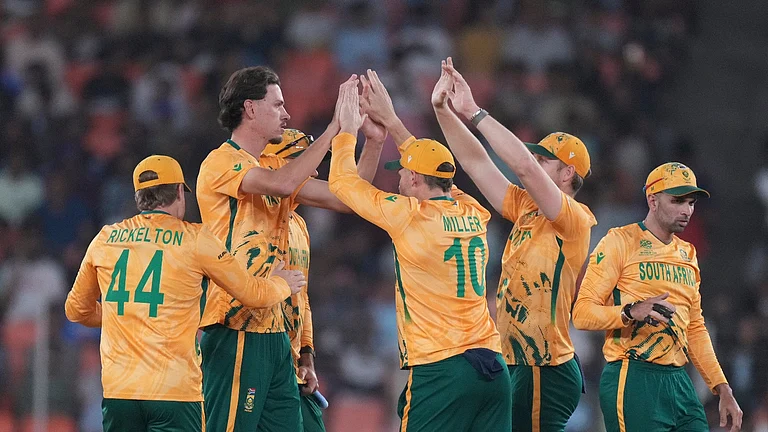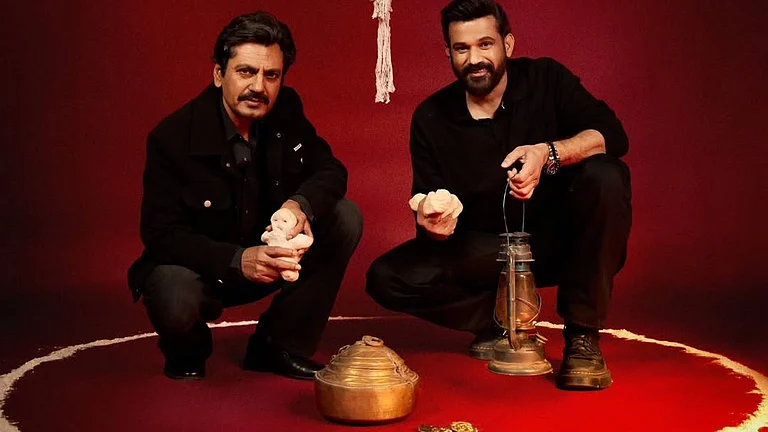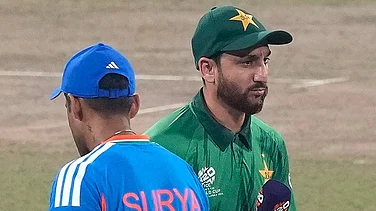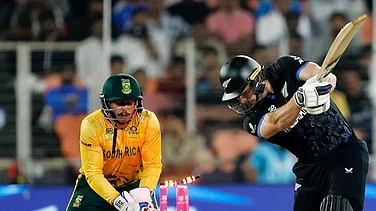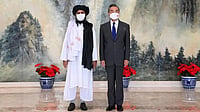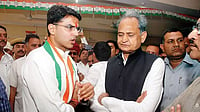In a conversation with Outlook, Atul Wassan, former medium pacer, spoke to Peerzada Muzamil about the political side of the India–Pakistan rivalry in cricket, and how things have changed over time on and off the field between the players of the two neighbours. Wassan has played for team India in Test matches and One Day Internationals. Besides, he has had a fairly successful Ranji career, picking up 213 wickets at 23.78. He has now shifted to TV, hosting cricket-related shows. He also appears on prime-time shows as an analyst of the game. Here are the edited excerpts:
Nowadays, we see players facing a lot of trolling on social media, just because they have dropped a catch. Does the social-media scrutiny and trolling affect the psyche of a cricketer?
I don’t think it should affect any player. Social media is a tool that is at the disposal of everybody. Having a hundred thousand followers on Twitter does not make them [public] experts of the game. Netizens are often partisan. Online justice does not make sense. On any social media platform, there is an abundance of trolls, who can brand anyone a villain if the latter drops a crucial catch or call a tail-ender heroic when he hits a six. This does not hold any ground in reality. In cricket, especially its commercialised versions like the IPL, anything is bound to happen. Although social media trolling should not affect any player, players need constant mentoring and counselling, they need to be looked after.
Post the matches, TV channels of India and Pakistan collaborate and bring in analysts who are supposed to comment on the game. But we often see them engaging in a no-holds-barred slanging matches from one newsroom to the another. Do you think such shows incite the animosity amongst the lovers of the game?
Well, I have been a part of such shows and from my experience I can say that there is always something more than what meets the eye. When it comes to television news channels, we need to look at it from the perspective of economics. I, for instance, try to bring in bandwidth, and analysis, but a TV anchor ends up taking the conversation towards beefing and venting, something that brings them viewership. People like when two panels are involved in a spat or a banter. They love it, what can you do? Especially, in the case of India–Pakistan matches— where there is a lot of sentiment involved—people want that tinge of jingoism. It brings the ratings up for a channel. Nevertheless, we recently saw India and Pakistan fans in the stands dancing together to the Ali Sethi song. This camaraderie shows something contrasting. Things are in reality getting better. We saw the agony and anger and what happened after Pakistan defeated Afghanistan in a match. The on-field show-off went beyond the pitch. Such incidents, though sad, are not rampant.
Owing to the brittle political relations between India and Pakistan, IPL is missing out on an array of brilliant cricketers like Babar and Rizwan, who are number one and three, respectively, in the T20 rankings. Do you think it is detrimental to the game and unfair to talented players?
In a way, I feel sorry for such talented players, because as part of the fraternity, I feel they deserve more exposure. The situation is not as black and white as we conjure up for ourselves. Earlier, cricket was used as a tool to mend the strained relations, a vehicle for diplomacy. However, it barely changed anything in the long run. Once someone came up to me and asked, “How does it feel to you that India is playing a country that was responsible for my nephew’s death in Kargil War?”
The question made me think. I feel that if the Indian state wants to deprive them of something that they really like, why not? It is absolutely the call of the Indian government, and they have a right to take such a step. If Pakistan is not mending its ways, then let us not play with them. Some exceptionally talented players miss out in the process. I feel sorry for them, but this is what it is.

Pakistan has threatened to pull out of the World Cup 2023 if India insists on playing the Asia Cup at a neutral venue. Cricket used to be a medium of soft diplomacy earlier. Do you think the game is suffering due to the political churning?
They [Pakistan] are making a lot of noise that “India is depriving us”. It is true. India is taking a hard-line approach. IPL owners now own teams in South Africa and Dubai. It is unlikely they will buy Pakistan players in auctions. In the long run, Pakistani cricketers will suffer. Talented cricketers like them need to play more and more cricket to sustain in the game. So, if we are not playing with them, not buying them, so be it. However, there is an irony there as well. We feel this boycott will mend our neighbour. It will not. Things have gone worse in that country. If cricket also goes, so be it.
Of late, we are witnessing instances of camaraderie and pleasant exchanges between Indian and Pakistani players, both on the field and on the social media. How were things during your time?
Even though I was good friends with Wasim Akram and Waqar Younis, on the field we barely exhibited any tinge of camaraderie. I
remember, once we were playing against Pakistan, and during the drinks break, I put my hand on Wasim’s shoulders and started to talk to him. He immediately said, “Haath hatale yaar abhi tou, match ke baad milenge, shaami milenge (Friend, please remove your hand from my shoulder, people are watching. Let us meet after the match in the evening).”
They had pressure on them to show the angst. There was a lot of showcasing just to please the public. On the field, there was pressure to exhibit patriotic behaviour. However, after the match, away from the public eye, we would get on very well with each other. We had befriended each other. You could not be seen as such in pbulic. It was taken as something unpatriotic. Nevertheless, things have changed nowadays. Everybody is friends now. Babar and Virat exchange pleasantries with each other. Players are taking tips from each other. This has eventually led to the fans of the respective countries to tone down their emotions as well, which is a good sign. But in our times, it was just more than a game. I guess Pakistan was always under pressure that way. They had been sold a dream that defeating India in a cricket match would be akin to defeating the country in a war. So, they would not do anything on the field that would seem unpatriotic.
Now, India has been progressing economically. There are a lot of undercurrents to this story and in the last 20 years, there has been a stark shift because we have left everybody behind. And Pakistan, unfortunately, is just surviving on two sugar-candies: they will get Kashmir and beat India in cricket.
ALSO READ: An Enigma Called Imran Khan
Do these political undercurrents creep into the dressing room?
A bad performance in such matches, before the 2000s, would be a matter of life and death for the players of both teams. A poor performance in an India–Pakistan match would push you out of the team and then the career ultimately. However, after the 2000s, Indian cricket became stable and amassed resources, which in turn opened up many opportunities for players—for instance, at domestic level.
A player nowadays has numerous opportunities even if he is not representing the national side. The financial stability of Indian players prevails even at the grassroots level. So then, that edge of being a matter of life and death has diminished for Indian cricketers as compared to their Pakistani counterparts. In Pakistan, they do not have enough options for a player. This might have an impact on the amount of pressure the Pakistan dressing room is often seen in.
(This appeared in the print edition as "‘Online Justice does not Make Sense’")








